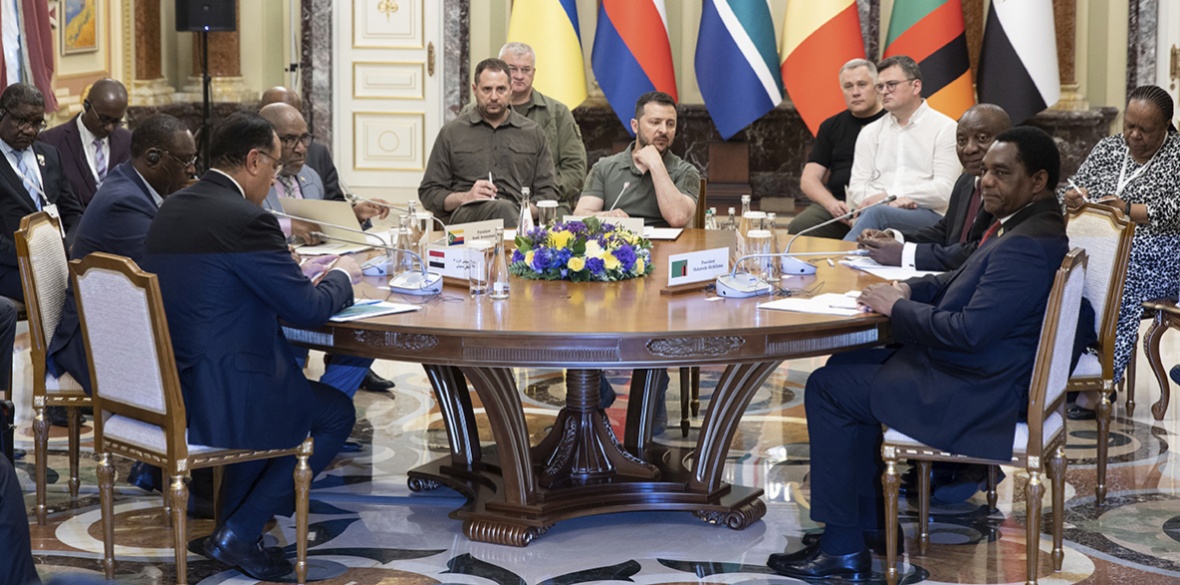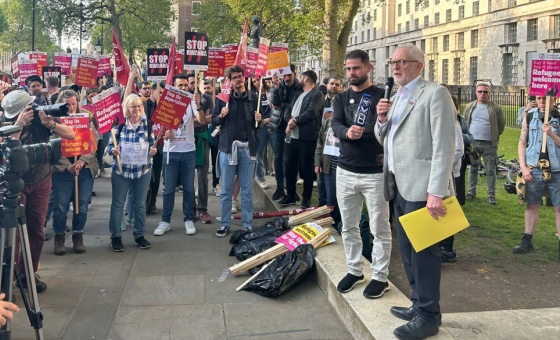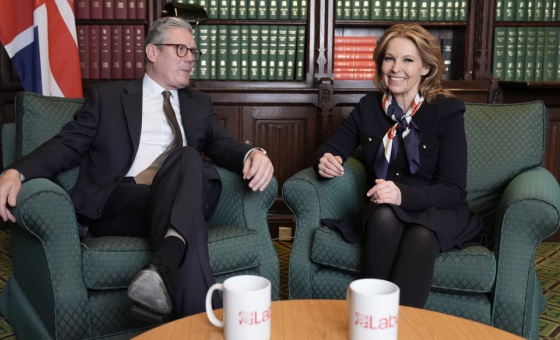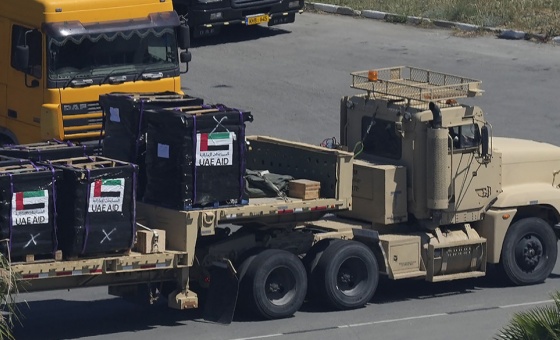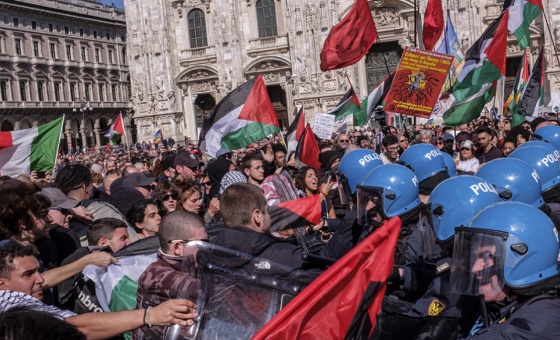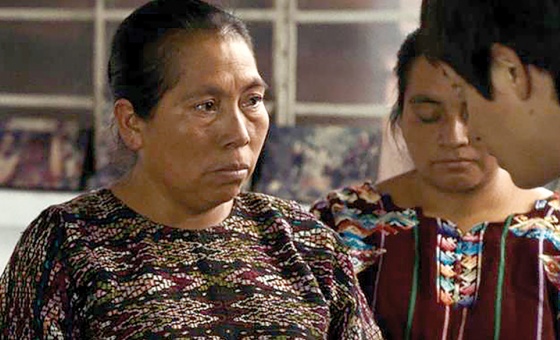This is the last article you can read this month
You can read more article this month
You can read more articles this month
Sorry your limit is up for this month
Reset on:
Please help support the Morning Star by subscribing here
ON June 9 2023, four senior members of the US Congress — two Democrats (Gregory Meeks and Chris Coons) and two Republicans (James Risch and Michael McCaul) — wrote a letter to high officials of the administration of US President Joe Biden.
The letter was about an annual forum to be held later this year in South Africa that is focused on increased trade between sub-Saharan African countries and the US. It called upon South Africa to openly come out against Russia or else face the consequences of cuts in US-South Africa trade.
The US lawmakers released the letter two days before a US-Africa Business Summit was held in Gaborone, Botswana, under the auspices of the Corporate Council of Africa, a business association set up in 1993 for businesses in the US that wish to trade with Africa.
Apart from the president of Botswana, the US-Africa Business Summit was attended by heads of state of Lesotho, Mozambique, Namibia, Swaziland, Zambia, and Zimbabwe.
The letter was designed to put pressure not only on the Biden administration but on the African governments to — in turn — pressure South Africa so as not to damage their trade relations with the corporate sector in the US.
South Africa’s stand on Ukraine
In August 2022, US Secretary of State Antony Blinken visited South Africa to urge the government of President Cyril Ramaphosa to condemn the Russian operations in Ukraine and to launch yet another US initiative to counter what it sees as Chinese influence on the continent.
At a press conference in Pretoria, South Africa’s capital, Blinken was treated to some straight talk from Ramaphosa’s foreign minister, the six-time cabinet member Naledi Pandor.
The US House of Representatives passed a Bill in April 2022 called the Countering Malign Russian Activities in Africa Act (the main sponsor of that was Congressman Meeks, who signed the recent letter).
Pandor reflected on that legislation and said that her government found it to be “a most unfortunate Bill.”
“From some of our partners in Europe and elsewhere,” Pandor told the press while sitting beside Blinken, “there has been a sense of patronising bullying — you choose this or else.”
Despite immense pressure on the government of South Africa, it has not buckled from its position of keeping all channels of diplomacy and commerce open and of joining the various opportunities to bring peace to Ukraine.
On June 5, four days before the US Congress members sent out their letter, South Africa’s Ramaphosa hosted a significant meeting of African heads of government (from Comoros Islands, Egypt, Senegal, Uganda and Zambia) as well as the head of the African Union to create the African Peace Initiative.
Subsequently, Ramaphosa led a seven African leaders delegation of the presidents of Comoros, Senegal, South Africa and Zambia, as well as Egypt’s prime minister and top envoys from the Republic of Congo and Uganda to Ukraine on Friday June 16 as part of the “peace mission.”
They met Ukrainian President Volodymyr Zelensky and on June 17, the African leaders travelled to meet Russian President Vladimir Putin in St Petersburg.
It is this “new non-aligned” attitude of the South African government that the US Congress members called a “neutral stance,” but rather than see neutrality as a positive force in the world, they see it as a threat that needs to be neutralised.
South Africa’s “new non-aligned” position has meant that it has not condemned any of the parties of the conflict and it has not honoured the sanctions regime pushed by the Western countries.
In August, South Africa will host the 15th Brics Summit, where heads of government from Brazil, Russia, India, and China will join South Africa as well as other guests to hold discussions about a range of issues.
Since the Brics first met in Russia in 2009, the US has found it to be an irritant, and, in particular, ever since the economies of these five significant countries began to grow at rates that outpaced those of the Triad (Europe, Japan and the US).
In March 2023, the International Criminal Court (ICC) framed a warrant for the arrest of Putin, based on an accusation of the “unlawful deportation of population (children).” Putin has denied the accusation.
Nonetheless, the existence of the warrant threatened to disrupt the Brics Summit, since it would place a burden on South Africa to refuse to honour a request from the ICC, of which it is a member state.
Ramaphosa’s government threatened to withdraw from the ICC and then said it would simply not honour the warrant. The US has used the arrest of Putin as a lever to put additional pressure on South Africa, and indeed to scuttle the Brics Summit in the process.
The letter by the US Congress members highlights the issue of Putin’s participation in the Brics summit and suggests that it provides the casus belli for sanctions on South Africa.
What the US is doing
The White House strategy on Africa that Blinken had come to sell focused attention on what it saw as the “growing foreign activity and influence” in the continent.
By “foreign activity and influence,” the US government means Chinese and Russian influence, not that of the old colonial powers who remain very much in place in most African countries.
China, says the US strategy, works to “advance its own narrow commercial and geopolitical interests, undermine transparency and openness, and weaken US relations with African peoples and governments.”
This statement suggests that US and European companies operate on the continent in a transparent way and that they do so for the benefit of the African peoples (the evidence from Western mining corporations shows precisely the opposite, with many of these companies running opaque deals that are built on the corrupting of governments and the impoverishment of the African people).
Russia is, meanwhile, accused of treating Africa “as a permissive environment for parastatals and private military companies” (words that could easily describe Western backing for militia groups to protect Western mining interests, such as in the Democratic Republic of the Congo and Niger).
In 2000, the US government passed the Africa Growth and Opportunity Act (AGOA), which is designed to promote the growth of US firms and allow them to operate on the African continent.
Each year, the US government holds an AGOA Forum to advance the goals of the AGOA. This year the AGOA Forum was to be held in South Africa, which is why the four US Congress members wrote their letter condemning the location for the forum and taking advantage of the opportunity to say that either South Africa adopt the US position on the war in Ukraine or it will face sanctions and the forum will be relocated.
While the AGOA is a commercial law, it does say that any country that participates must “not engage in activities that undermine US national security or foreign policy interests.” Because of that clause in the AGOA, the four US Congress members write that South Africa is “in danger of losing AGOA benefits.”
In fact, the letter itself shows how the US uses the “narrow commercial” interests of its multinational firms to advance its parochial “geopolitical interests” (words that the new US strategy on Africa uses to describe Chinese actions).
US interests in southern Africa
This current posture of the US cannot be understood outside of its historical ties with the southern African region. For example, during the cold war, the US employed an anti-communist tactic to undermine genuine national liberation efforts of the oppressed people of the region — under the yoke of centuries of colonial repression by the West.
The US funded counter-revolutionary rogue elements such as Jonas Savimbi’s Unita bandits in Angola. This was couched in “anti-communist” terms. Most tellingly, the US aided and abetted the apartheid regime, a system labelled a crime against humanity by the UN general assembly in 1966.
Again, the US hid behind the anti-communist strategy and characterised the African National Congress (ANC), South Africa’s national liberation organisation and the current governing party, as a terrorist organisation.
Its leaders like Nelson Mandela were bandied about as terrorists by the US. That apartheid endured for as long as it did is thanks to the financial and military support of the US which played a typical imperialist role in exercising global hegemony in defence of capitalism and its primitive forms of accumulation in the region.
The Ronald Reagan administration supported the apartheid regime’s hostility towards African states, particularly those in the southern African region.
Thus, it is ironic that the US is trying to portray itself as the champion of everything, from human rights to democracy, when the history of this region proves the contrary.
When it was clear that apartheid was going to be defeated through the sheer determination of the organised oppressed masses, the US changed tack and passed the Comprehensive Anti-Apartheid Act in 1986. Reagan had sent his emissary Robert Cabelly to convince the ANC to accept the apartheid regime’s reforms, which the ANC rejected.
This sudden change by the US towards South Africa was driven by fears of an inevitable revolutionary outcome in South Africa. The US couldn’t fathom the South African revolution spawning a process that threaten its imperialist interests in the region and the world.
For the US, South Africa was nothing but “an area of profitable investment, a source of high profits, a storehouse of valuable raw materials, and extensive market for the sale of industrial goods and military hardware (usually via Israel),” as Mzala Nxumalo observed.
US policy is driven by “trade,” which really means the over 600 US businesses that continue to exploit the continent (with South Africa as their regional headquarters). The irritation of the US towards South Africa’s neutral stance on the war in Ukraine cannot be understood outside of this context.
Attempts to abort the South African revolution
Regime change is a well-known and well-documented international strategy of the US. It was surprising that many were stunned when Biden remarked that Putin “can no longer stay in power” in his March 2022 speech in Poland. For years the US has deployed the “regime change” strategy to maintain its global hegemony.
From the colour revolution of Serbia to the invasion of Iraq, the US has done it all. The views of a possible regime change agenda have gained currency since South Africa took a bold stance to actively build a strong Brics as a counter-hegemony power bloc against the US dominance.
Therefore, the current pressure campaign against the government of Cyril Ramaphosa is not innocent. It is part of an overall political strategy for the continent.
In 2024, South Africans will go to the polls to elect their government. Currently, due to serious problems in the government’s handling of the power sector and of the employment situation, Ramaphosa’s ruling ANC coalition faces a genuine threat from the right-wing Democratic Alliance (DA), a political force built on the ruins of the old apartheid-era parties.
Both the US politicians and the DA repeat the same talking points regarding South African-Russian relations, including the same interpretation of harmless meetings and the same lies.
It was thus predictable that the premier of the DA-led Western Cape administration Alan Winde led a provincial delegation to the US under the guise to discuss AGOA.
This is a clear attempt at undermining Ramaphosa’s administration and the constitutional principle of South Africa’s unitary state. The strategy is to elevate the right-wing DA, an apartheid relic, as a possible government in waiting.
The most egregious falsehood was made by US ambassador Reuben Brigety, who accused the South African government of providing weapons to Russia when a Russian ship (Lady R) docked in South Africa.
Pandor reprimanded Brigety, who is said to have apologised in mid-May. Nonetheless, in a statement made on June 15, the DA continued to circulate “allegations that South Africa supplied weapons to Russia in December” as a way to increase the pressure against the Ramaphosa government.
Mandla J Radebe is a Johannesburg-based activist and author. He is the deputy chair of the South African Communist Party in Gauteng Province.
Vijay Prashad is the director of Tricontinental: Institute for Social Research.

